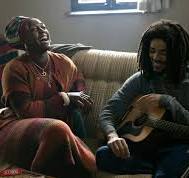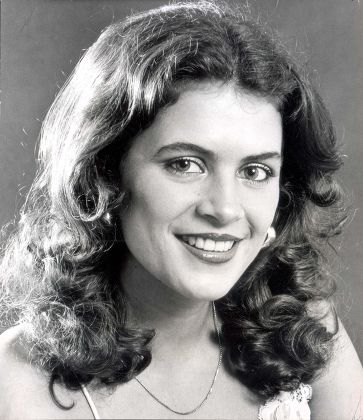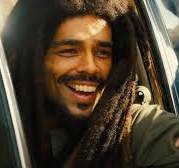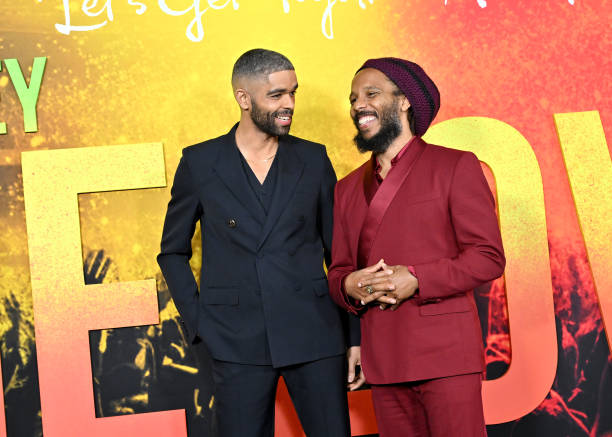I love Bob Marley. I love his peace and brotherhood schtick and above all I love his music.
I didn’t actually read any reviews till after I’d seen the movie, and I was surprised how negative they were: the consensus seemed to be that it was too reverential, the dialogue was poor, and there was not enough illumination of Marley the man.
I’m not sure I agree with these criticisms but in any case I would have gone to see it for three (possibly shallow) reasons: the music, the Caribbean accents and the presence of leading man Kingsley Ben Adir, who absolutely nails Marley’s charisma, his physical gestures, his stage moves and of course that charming accent for which I am a total sucker.
Some of these critics said Ben-Adir is too tall and too much of a pretty boy to play the shorter, more rough-hewn Marley. Okay, Ben-Adir IS devilishly good-looking, but name me a biopic in which the central character is played by someone LESS attractive than the real person. What’s more, Ben-Adir learnt to sing and play guitar for this movie, and his voice is melded seamlessly with Marley’s in the singing sequences. I didn’t know this till after I’d seen the movie, and he does a brilliant job.
The story starts in 1976. Jamaica is riven by gang and political violence. Marley is already the biggest recording star in the country, but he is also a target for warring factions who seek to either exploit or destroy him. He survives an assassination attempt which grievously wounds his manager and his wife Rita, then takes off for London where they record the seminal album Exodus – the one that makes him a global superstar. It ends with his return to Jamaica in 1978 where against the advice of sundry well-wishers who fear for his life he insists on performing the free One Love concert in hopes that it will bring an end to political divisions within Jamaica.
(In this at least he succeeded. Marley brought the two main political rivals onstage, put his arms around them and had them shake hands. There is footage of this famous moment at the end. Whether it put a stop to the gang violence is another question.)
Throughout there are many flashbacks to crucial episodes in his childhood and youth. Much is made of Marley’s imaginings about the father he barely knew – Norval Sinclair Marley, a plantation supervisor who met and married Marley’s mother Cedella, a plantation worker, when she was 18 and he was 60. He did send the boy to school but otherwise abandoned him to the care of his mother.
Bob Marley had just one photograph, given him by his mother, of his father on horseback. His fantasies about this elusive figure – the mounted horseman, a burning crop, a boy running from the flames – are tied up with his immersion in Rastafarianism, a strange religion whose followers believe Emperor Haile Selassie of Ethiopia was the second coming of Christ, the Black Messiah sent to redeem all black people. It really took off in Jamaica when Selassie visited in 1966. Rita Marley was an early convert and it was she who introduced Marley to it, and he became a devotee.
The film is as reverential about Rastafarianism as it is about Rita herself, which is hardly surprising as Rita co-produced the film with their son Ziggy. It’s clear that she, and presumably her son, still regard it as the true spiritual path.
Rita is portrayed as the principal strong loving supportive figure in Marley’s life and the emotional mainstay of their big sprawling family which took in the many children he fathered outside that marriage. These included Damien, Marley’s son by the beautiful Cindy Breakspeare who was a singer and musician in her own right. Critics say the film should not have ignored her role in Marley’s life. But I suppose you can’t blame Rita for that. Her movie, her POV.



While Marley comes across as the brave and generous man he was by all accounts, in one scene she gives him a mighty load of stick for his failings as a husband and father and even hits him, so he doesn’t get off entirely scot free.
I loved this movie. A couple of scenes linger in my memory:
Marley is noodling away on his guitar outside his home in Jamaica, having put the finishing touches to the lovely Redemption Song. Two of the children come out to sit nearby and listen. Rita appears in the doorway and when he finishes playing he asks her did she like it? ‘I love all your songs, Bob’, she replies.
When Marley’s in London recording Exodus, he goes with a couple of his Wailer bandmates to check out a Clash gig. It’s peak punk time and racial tensions are fuelling street violence. The three black men walk in full of Rastaman attitude in their outlandish clothes, their dreadlocks and their shades, but these tough guys are struck by the contrast between the angry nihilistic anarchy of punk music and the gentler melodious rhythms of their own reggae, with its message of peace and brotherhood.
Ah, the reggae music. Even when it’s expressing resistance and rebelliousness there’s something plaintive and uplifting about it. There’s plenty of it here – not one gorgeous hit is left out. Everyone at my screening was swaying or nodding or otherwise grooving along. As the credits rolled, one bloke up the back got up and danced, inviting me, as I made my way out, to join him. Reader, I did.
Postscript: Where have you seen Kingsley Ben-Adir before?
He plays Colonel Ben Younger in Peaky Blinders, private detective Karim Washington on The OA (on Netflix), Malcolm X in One Night in Miami, and Barack Obama in The Comey Rule. He apparently also played a Ken doll in Barbie, AND… he plays pathologist Marcus Summer in Vera!



Further Fun Facts: Mick Jagger gets a credit as a character! I didn’t notice his appearance in the movie and, google as I might, I could not work out where it was. Moreover, the IMDb website states that James Norton plays Jagger. Not so! Norton (the crime-solving vicar in Grantchester) here plays Chris Blackwell, the Jamaican-born Englishman who founded Island Records and effectively ‘discovered’ Marley. Further forensic googling revealed that Jagger is played by Cosmo Wellings, an actor so unfamous there isn’t even a thumbnail pic of him in the cast list on the movie website.
Further Sad Fact: what killed Marley, and it’s depicted poignantly in the movie, was a nasty thing called acral lentiginous melanoma.



